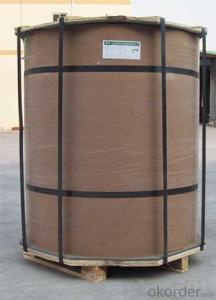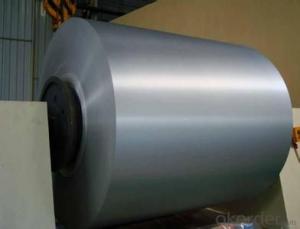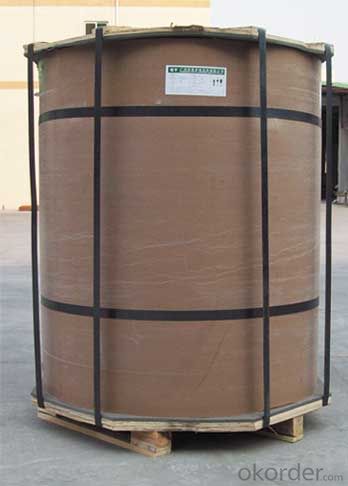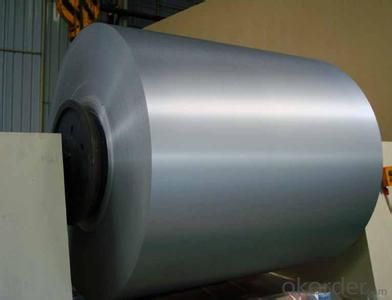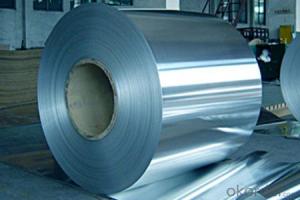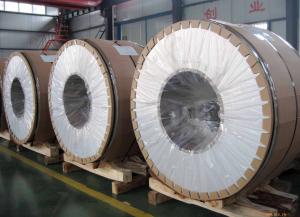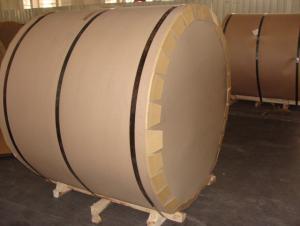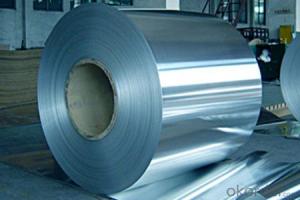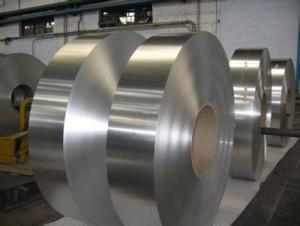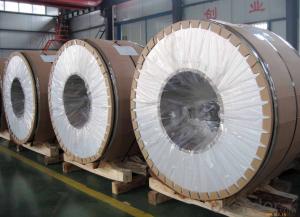Mill-Finished Aluminum Coils 3xxx - Flat Rolled Aluminum Coil Ohio
- Loading Port:
- China Main Port
- Payment Terms:
- TT OR LC
- Min Order Qty:
- -
- Supply Capability:
- -
OKorder Service Pledge
OKorder Financial Service
You Might Also Like
Specifications
Aluminum Coil
1.Manfacture
2.Woodenbox package
3.Material is from big aluminum factory
High Quality and Factory Price Aluminum Coil
Specifications
Grade
| 1000 Series: 1050 1060 1070 1100 1200 1235 etc. 3000 Series: 3003 3004 3005 3104 3105 3A21 etc. 5000 Series: 5005 5052 5083 5086 5154 5182 5251 5754 etc. 6000 Series: 6061 6063 6082 6A02 etc. 8000 Series: 8006 8011 8079 etc. |
Thickness | 0.05~10mm |
Width | <1600mm |
Color | Metallic, Solid, RAL or by customer requirements |
Coating paint: | PVDF(Polyvinylidene Fluoride), PE(Polyester ) |
Coating thickness | as per customer’s request |
Gloss | 10-90%(EN ISO-2813:1994) |
Total coating thick | Polyester18~27micron(EN ISO-2360:1995) PVDF27 ~35micron(EN ISO-2360:1995) |
Coating hardness | 2H |
Protective film | PVC film, Colorless transparent or White-black |
Adhesion | 5B (EN ISO-2409:1994) |
Impact resistance | No cracking and peeling (A.S.T.M D2794-1993) |
Flexibility (T-bend) | 0T- 2T |
Temper | H16, H18, H24, H26, H26 |
Certification | ISO9001:2000, CE, SGS |
Coil's standard diameter | 1100mm |
Inner Diameter | 405mm/505mm |
Coil's standard weight | 2000kgs |
Payment | L/C ,T/T |
- Q: How are aluminum coils coated for color matching and aesthetic purposes?
- The process of coil coating is commonly used to coat aluminum coils for color matching and aesthetic purposes. It is a continuous and highly automated process where a layer of paint or coating is applied onto the surface of the aluminum coil. To start the coil coating process, the aluminum coil is thoroughly cleaned to remove dirt, grease, and oxidation. This is done using chemical cleaning agents and mechanical scrubbing methods to ensure a clean and smooth surface. Once the cleaning process is complete, a primer is applied to the aluminum coil. The primer acts as a bonding agent, improving the adhesion of the subsequent layers of paint or coating. It also helps to prevent corrosion on the aluminum surface. After the primer is applied, the aluminum coil undergoes a series of rollers where the desired color coating is applied. This can be done through various methods such as coil coating, spray coating, or powder coating. Coil coating is the most common method, involving the application of a liquid paint or coating onto the metal coil surface. The coating is then cured or dried using heat to ensure proper adhesion and durability. In order to achieve color matching and aesthetic purposes, the paint or coating used is often customized to specific color palettes or customer requirements. This customization is achieved by using a wide range of pigments and additives that alter the color, texture, and gloss level of the coating. Furthermore, specialized coatings can be applied to aluminum coils to enhance their aesthetic properties. For example, there are coatings available that give the appearance of natural wood or stone, providing a more visually appealing finish. Overall, the process of coating aluminum coils for color matching and aesthetic purposes involves thorough cleaning, priming, and the application of customized paint or coatings. This ensures that the aluminum coils meet the desired aesthetics while also providing durability and protection against corrosion.
- Q: Can we provide raw materials, aluminium coils and aluminum panels for several integrated ceilings?
- You go to my space, add my QQ bar, I do aluminum, aluminum coil, aluminum wafer, and I also want to know about the requirements of integrated ceiling ~ ha ha!
- Q: Which type of wheel is more durable, long-lasting and which wheel type would cost more, Aluminum or chrome?
- Aluminum are lighter, which mean faster car. Stronger, stay cleaner longer. Chrome are more expensive. Just made for people who like being flashy.
- Q: What are the potential applications of stucco-embossed aluminum coils?
- Stucco-embossed aluminum coils have a wide range of potential applications due to their unique properties and aesthetic appeal. Here are some potential applications of stucco-embossed aluminum coils: 1. Building and construction: Stucco-embossed aluminum coils are commonly used in the construction industry for cladding and roofing purposes. The textured surface of the stucco pattern enhances the durability and strength of the aluminum, making it suitable for exterior applications. It can be used on commercial and residential buildings to provide a visually appealing and long-lasting finish. 2. Insulation: Stucco-embossed aluminum coils can also be used for insulation purposes. The textured surface helps to increase the surface area, which improves the thermal conductivity of the material. This makes it an ideal choice for applications where heat transfer needs to be controlled, such as in HVAC systems or refrigeration units. 3. Appliances: Stucco-embossed aluminum coils are commonly used in the manufacturing of various appliances. The textured surface not only adds visual interest but also provides a durable and easy-to-clean finish. It can be used for the production of kitchen appliances like refrigerators, dishwashers, and ovens, as well as for other household appliances such as air conditioners or water heaters. 4. Transportation: Stucco-embossed aluminum coils find applications in the transportation industry as well. The textured surface provides improved traction, making it suitable for flooring and decking in vehicles like buses, trains, and ships. It is also used for decorative purposes in the interior and exterior parts of automobiles, giving them a stylish and modern look. 5. Packaging: Stucco-embossed aluminum coils can be utilized in the packaging industry as well. The textured surface adds strength and rigidity to the material, making it ideal for manufacturing containers, trays, and packaging materials that require durability and protection. It can be used for food and beverage packaging, pharmaceutical packaging, and various other applications where a strong and visually appealing packaging solution is needed. Overall, the potential applications of stucco-embossed aluminum coils are diverse and versatile. From construction to insulation, appliances to transportation, and packaging to various other industries, the unique properties and aesthetic appeal of stucco-embossed aluminum make it a popular choice for a wide range of applications.
- Q: What are the vibration damping properties of aluminum coils?
- Aluminum coils have excellent vibration damping properties, making them an ideal choice for various applications that require vibration control. Due to their high stiffness and low density, aluminum coils effectively absorb and dissipate vibrations, reducing the amplitude and frequency of oscillations. This vibration damping ability is beneficial in industries such as automotive, aerospace, and electronics, where minimizing vibration is crucial for performance, durability, and overall user experience. Additionally, aluminum coils' ability to dampen vibrations helps to reduce noise levels, leading to quieter operations and environments. Overall, aluminum coils' vibration damping properties contribute to improved product performance, increased safety, and enhanced user comfort.
- Q: What are some common applications for aluminum coils?
- Some common applications for aluminum coils include manufacturing of roofing materials, HVAC systems, automotive parts, electrical wiring, packaging materials, and construction materials.
- Q: This question asks for a comparison of the benefits and drawbacks associated with using aluminum coil.
- <p>Aluminum coil offers several advantages such as high strength-to-weight ratio, corrosion resistance, and excellent thermal and electrical conductivity. It is also cost-effective and easy to form, making it ideal for various applications like construction, automotive, and electrical industries. However, it has some disadvantages, including lower strength compared to steel, potential for galvanic corrosion when in contact with dissimilar metals, and a higher likelihood of denting or denting. Additionally, aluminum's recycling process can be energy-intensive, which may impact its environmental sustainability.</p>
- Q: What are the potential applications of brushed aluminum coils?
- Brushed aluminum coils have a wide range of potential applications in various industries. They are commonly used in architectural and interior design projects, such as cladding, roofing, wall panels, and decorative elements. Additionally, brushed aluminum coils are suitable for manufacturing kitchen appliances, automotive parts, electronics, and signage due to their aesthetic appeal, durability, and corrosion resistance.
- Q: Are there any restrictions on the export or import of aluminum coils?
- The export or import of aluminum coils is subject to restrictions that vary depending on the country and specific regulations in place. These restrictions encompass various measures such as export licenses, quotas, and tariffs. Export licenses are often necessary to comply with export control regulations, particularly for sensitive industries or countries. Quotas restrict the quantity of aluminum coils that can be exported or imported within a specific timeframe. Tariffs, on the other hand, involve taxes imposed on imported goods, impacting the cost and competitiveness of aluminum coils in the market. Furthermore, additional restrictions may be imposed concerning quality standards, environmental regulations, or trade agreements between countries. Therefore, it is crucial for individuals or businesses engaged in the export or import of aluminum coils to conduct thorough research and gain a comprehensive understanding of the specific restrictions within their respective jurisdictions. Seeking guidance from legal or trade experts can facilitate navigation through these restrictions and ensure compliance with applicable laws.
- Q: What does it mean to slice aluminum coil by decoiler machine?
- The operating procedures of decoiler machine: 1, Select appropriate aluminum coil according to production work order requirement to be processed, paying attention to the thickness, width and material of aluminum coil. 2, Put the aluminum coil into the coil loading car with traveling crane and inch the car into the uncoiler. The aluminum coil and decoiler machine should be in the same direction. Hold the aluminum coil down with leading head, and open the auxiliary bearing. 3, Turn on the shovel head, and inch the uncoiler to lead the aluminum sheet into the leveler. Adjust the leveler according to the thickness and width of aluminum sheet to ensure the flatness. 4, Turn on the front gap bridge and back gap bridge in control main platform, inch the leveler to lead aluminum sheet into re-leveler. Adjust the re-leveler to ensure the flatness of aluminum sheet. Put it into the shear gauge and plate shearer. 5, Take back the front and back gap bridge. Inch the plate shearer to cut off the sheet head and shear the aluminum sheet according to production work order. Check the first sheet to see whether it meets the quality standard and whether there is defect in flatness, length, diagonal, and surface of aluminum sheet. If it is qualified, turn on the conveyor. Put the aluminum sheet holder on the pallet. Adjust the pallet according to the width and length of aluminum sheet. Input quantity and length on the control main platform. Then turn on the auto control to produce automatically. The production process can be observed at any time. 6, If there is aluminum coil left, unwind, package and put it into storage in reverse steps.
Send your message to us
Mill-Finished Aluminum Coils 3xxx - Flat Rolled Aluminum Coil Ohio
- Loading Port:
- China Main Port
- Payment Terms:
- TT OR LC
- Min Order Qty:
- -
- Supply Capability:
- -
OKorder Service Pledge
OKorder Financial Service
Similar products
Hot products
Hot Searches
Related keywords
